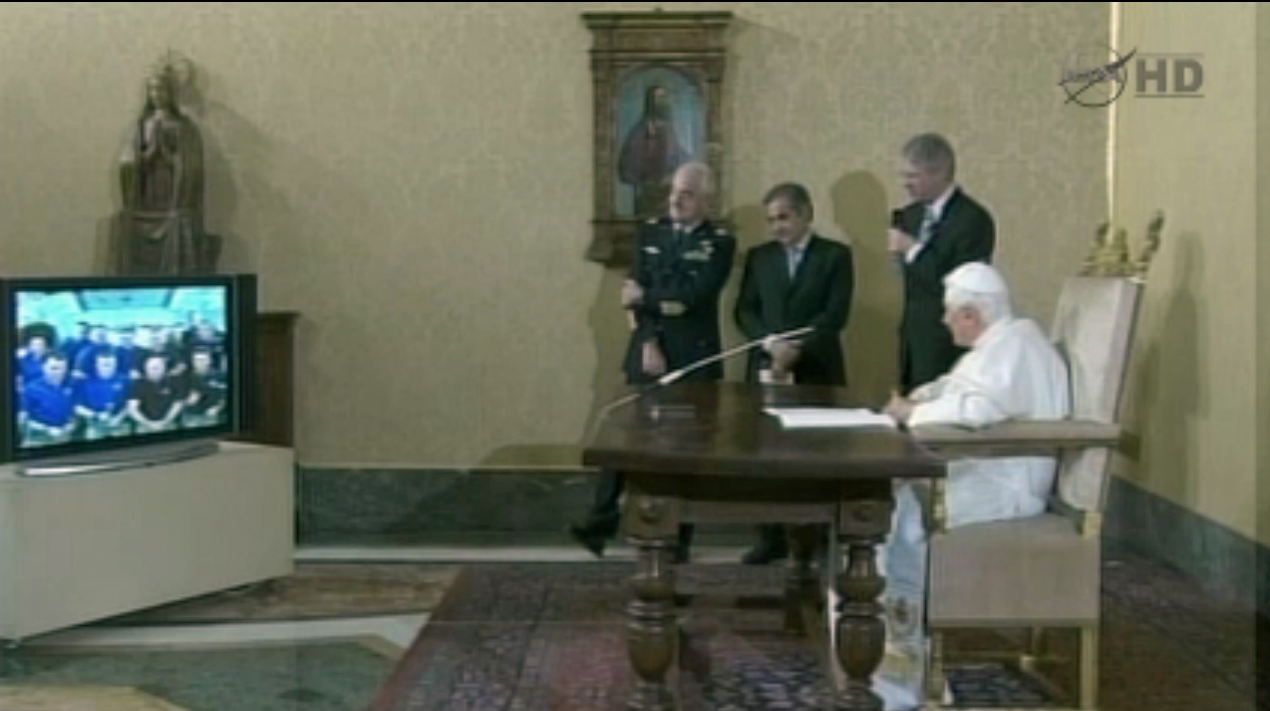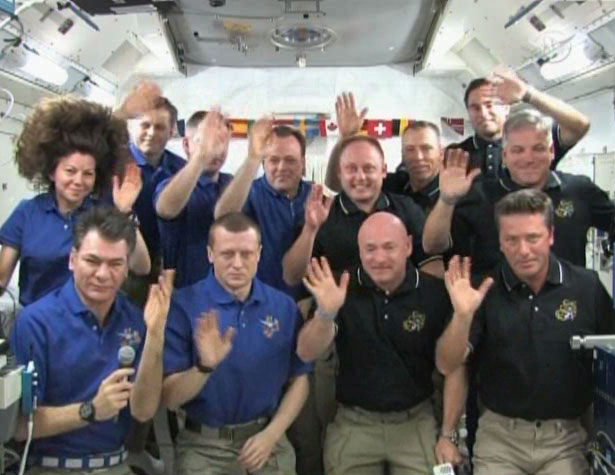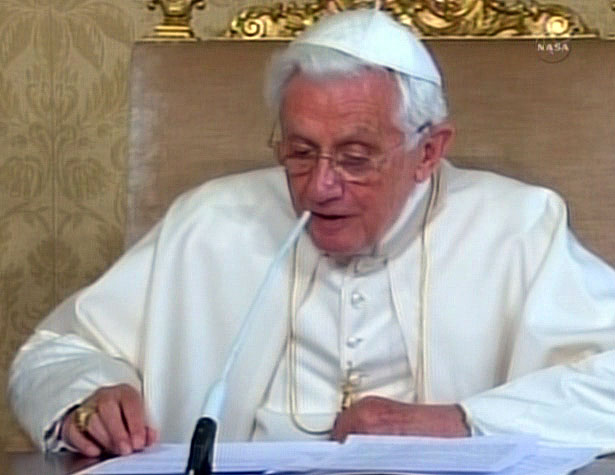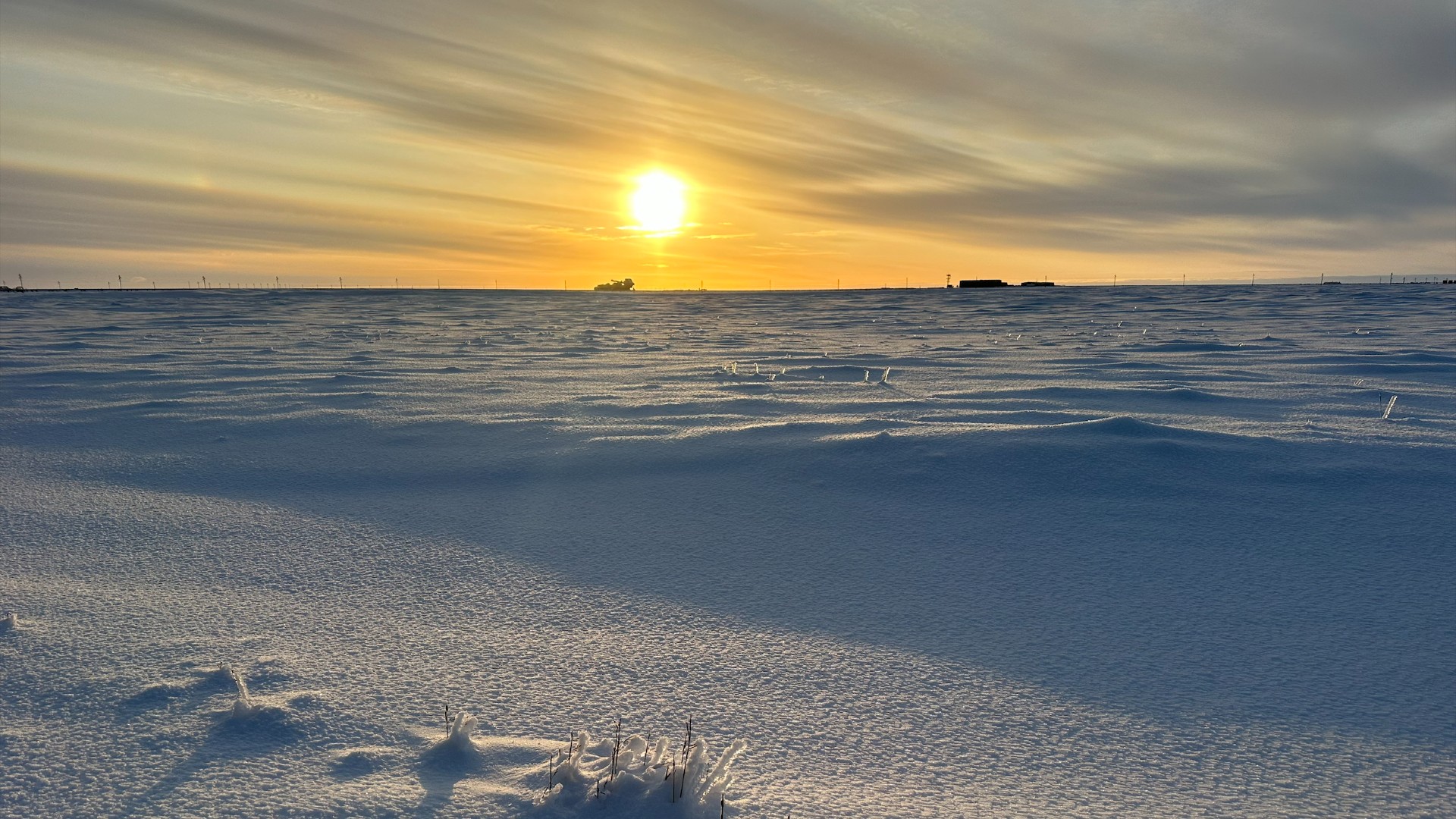Pope Benedict XVI Makes 1st Heavenly Call to Astronauts in Space
This story was updated at 9:55 a.m. ET.
HOUSTON — In a first for The Vatican, Pope Benedict XVI called to the heavens on Saturday, but instead of reaching God, he spoke to two Italian astronauts and their 10 colleagues working on board the International Space Station (ISS).
"Dear astronauts, I am very happy to have this extraordinary opportunity to converse with you during your mission and especially grateful to be able to speak to so many of you as both crews are present on the space station at this time," said the Pope, reading in English from prepared remarks. [Video: Science & Faith Merge in Pope's Space Station Talk]
The video call, which began at 7:11 a.m. EDT (1111 GMT), originated from the Foconi Room of the Vatican Library in Rome, Italy. It was organized by the European Space Agency (ESA), whose astronauts Paolo Nespoli and Roberto Vittori are currently working in space.
The conversation marked the first time that the Pope has spoken with astronauts in orbit.
"This conversation gives me the chance to express my own admiration and appreciation to you and all those collaborating making your mission possible and offer my heartfelt encouragement to bring it to a safe and successful conclusion," the Pope said. [Photo: Pope Benedict XVI speaks with astronauts]
Joining the two Italians for the space-to-ground conversation were the U.S. and Russian crew members of space shuttle Endeavour’s STS-134 mission and the space station’s Expedition 27.
Breaking space news, the latest updates on rocket launches, skywatching events and more!
ESA astronaut Thomas Reiter, who like Pope Benedict XVI is German, joined His Holiness in The Vatican together with the president of the Italian Space Agency Enrico Saggese and General Giuseppe Bernardis with the Italian Air Force.
"An adventure of the human spirit"
After a brief introduction, the Pope asked the astronauts and cosmonauts questions concerning their unique vantage point in space and how it affected their view on a variety of subjects ranging from the violence experienced between nations to protecting the Earth's environment to their personal connection to God.
"Space exploration is a fascinating scientific adventure. I know you have been studying your equipment to further scientific research and to study radiation coming from outer space. But I think it is also an adventure of the human spirit. A powerful stimulus to reflect on the origins and on the destiny of the universe and humanity," the Pope said.
"In the midst of your intense work and research, do you ever stop and reflect like this, perhaps even pray to the creator? Or will it be easier for you to think about these things once you have returned to Earth?" he asked.
"When we have a moment to look down [at Earth], the beauty is the three-dimensional effect and the beauty of the planet is capturing our heart ... capturing my heart," replied Vittori. "And I do pray. I do pray for me, for our families, for our future."
The Pope, speaking in Italian, also addressed Nespoli about the recent death of his mother, mentioning that he had prayed for her.
"Holy father, I felt your prayers and everyone's prayers arriving up here, where outside the world we orbit and we have a vantage point to look at the Earth and we feel everything around us," Nespoli replied. "I felt very far but also very close and the thought of feeling all of you near me at this time has been a great relief."
"Tell me of your experiences"
Turning to the subject of practical concerns, the Pope asked the crew members about the absurdity of violence seen on Earth, specifically citing the assassination attempt earlier this year on the wife of Endeavour’s commander, Congresswoman Gabrielle Giffords.
"I know that Mark Kelly's wife was a victim of an attack and I hope her health continues to improve,” he said. "When you are contemplating the Earth from up there, do you ever wonder about the way nations and people live together down here and about how science can contribute to the cause of peace?"
"Thank you the kind words, your holiness, and thank you for mentioning my wife Gabby," Kelly replied. "It's a very good question. We fly over most of the world and you don't see borders. But at the same time, we realize that people fight with each other and there's a lot of violence in this world and it is really an unfortunate thing."
"On Earth, often people fight for energy. In space, we use solar power and we have fuel cells on the space shuttle, but on the space station, it's the science and technology that we put in to the space station to develop a solar power capability [that] gives us pretty much unlimited amount of energy. And if those technologies could be adapted more on Earth, we could possibly reduce some of that violence," Kelly said.
The Pope also asked the astronauts if they saw "signs of phenomena" that we need to be more attentive to protecting the Earth’s environment.
"On the one hand, we can see how indescribably beautiful the planet that we have been is, but on the other hand, we can really, clearly see how fragile it is," replied Ron Garan, a NASA astronaut serving as a flight engineer on the space station. [Amazing space photos by astronaut Ron Garan]
"The atmosphere for instance," he continued. "The atmosphere when viewed from space is paper thin, and to think that this paper thin layer is all that separates every living thing from the vacuum of space and all that protects us is really a sobering thought."
Asked by the Pope what the most important message the astronauts could convey on their return, Endeavour mission specialist Mike Fincke stressed exploration and cooperation.
"We can look down and see our beautiful planet that God has made and it is the most beautiful planet in the whole solar system. However, if we look up, we can see the rest of the universe. And the rest of the universe is out there for us to go and explore. The International Space Station is just one symbol, one example of what human beings can do when we work together constructively," Fincke said.
"So our message I think, one of our many messages, but I think one of our most important messages is to let the children of the planet, the young people know, that there is a whole universe for us to go explore. And when we do it together, there is nothing we cannot accomplish," he said.
"Spearheading humanity's exploration"
Vittori, who launched with Endeavour on its 16-day final mission, carried to space a silver medal donated by the Pope. [Photos of Space Endeavour's Final Launch]
"We are struck by the mystery of His Greatness," said the Pope. "That is why the medal I gave Robert as a sign of my own participation in your mission represents the creation of man as painted by Michelangelo in the Sistine Chapel."
Vittori displayed the medal during the video conversation, letting it float in front of him.
"I took with me the coin and I allow this coin to float in front of me to demonstrate microgravity. I shall thank you very much for this opportunity and I would like to allow this coin to float to my friend and colleague Paolo," Vittori said. He will make return on Earth on the Soyuz. I brought it with me to space and he will take down on Earth to then give back to you."
The Pope thanked the crew members for this "wonderful opportunity" to talk with them.
"Humanity is experiencing a period of extremely rapid progress in the fields of scientific knowledge and technical applications," he said. "In a sense, you are our representatives spearheading humanity's exploration of new spaces and possibilities for our future, going beyond the limitations of our everyday existence."
"You have helped me and many other people to reflect together on important issues which regard the future of humanity. I wish you the very best for your work and for the success of your great mission in the service of science, international collaboration, authentic progress and for peace in the world. I will continue to follow you in my thoughts and prayers and in bidding I impart my historic blessing."
You can follow Robert Pearlman on Twitter at @robertpearlman. Follow SPACE.com for the latest in space science and exploration news on Twitter @Spacedotcom and on Facebook.

Robert Pearlman is a space historian, journalist and the founder and editor of collectSPACE.com, a daily news publication and community devoted to space history with a particular focus on how and where space exploration intersects with pop culture. Pearlman is also a contributing writer for Space.com and co-author of "Space Stations: The Art, Science, and Reality of Working in Space” published by Smithsonian Books in 2018.
In 2009, he was inducted into the U.S. Space Camp Hall of Fame in Huntsville, Alabama. In 2021, he was honored by the American Astronautical Society with the Ordway Award for Sustained Excellence in Spaceflight History. In 2023, the National Space Club Florida Committee recognized Pearlman with the Kolcum News and Communications Award for excellence in telling the space story along the Space Coast and throughout the world.




